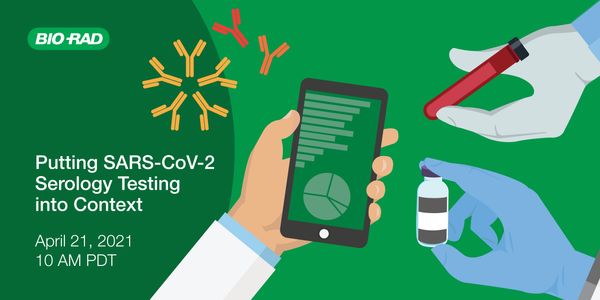Science of Infectious Disease
An infectious disease can be defined as an illness due to a pathogen or its toxic product, which arises through transmission from an infected person, an infected animal, or a contaminated inanimate object to a susceptible host. There are several scientific practices in place to identify and/or treat an infectious disease.
-
JUN 29, 2021 | 7:00 AMDate: June 29, 2021 Time: 7:00am (PDT), 10:00am (EDT) The Unyvero Lower Respiratory Tract Panel demonstrated reliable concordance with culture based methods for organism identification from...JUN 22, 2021 | 10:00 AMDate: June 22, 2021 Time: 10:00am PST The objectives of this presentation are (1) to review current and emerging SARS-CoV-2 serology applications, (2) to discuss variation among different SA...JUN 22, 2021 | 10:00 AMDate: June 22, 2021 Time: 10:00am (PDT), 1:00pm (EDT) Antimicrobial resistance (AMR) has emerged as one of the principal public health problems of the 21st century. It threatens the effectiv...JUN 09, 2021 | 8:00 AMDATE: June 9, 2021 TIME: 8:00am PDT Analyzing antigen-specific T cells is essential to understand fundamental immunological processes in the contexts of immuno-oncology, infectious dise...JUN 09, 2021 | 7:00 AMDate: June 9, 2021 Time: 09 June 2021, 7am PDT, 10am EDT, 4pm CEST cells with dramatic implications on the validity of past cell culture related research. The fact that at least 509 cell lin...JUN 08, 2021 | 9:00 AMDate: June 8, 2021 Time: 9:00am PDT Reducing the spread of highly infectious and deadly diseases within the population, vaccine development is crucial in saving millions of lives each year....Speaker: Laura Chapman , Ketil Pedersen, Ph.D , Alexander "Sasha" Vlassov , Matt MckennaSponsored By: Thermo Fisher ScientificJUN 03, 2021 | 6:00 AMDATE: June 03, 2021 TIME: 6:00am PDT HEV, with over 3 million clinical cases, 70,000 deaths, and 3,000 stillbirths, mostly in Asia and Africa, causing 3.3% of all deaths from viral hepatitis...MAY 27, 2021 | 9:00 AMDate: May 27, 2021 Time: 9:00am PDT Since the current SARS-CoV-2 outbreak, there has been an urgent need to define the immune response and understand the relevant immunological mechanisms un...MAY 18, 2021 | 8:00 AMDate: May 18, 2021 Time: 8:00am (PST) The global pandemic has caused an increased focus and scrutiny on molecular diagnostic assay development, resulting in a need for assays that provide qu...MAY 13, 2021 | 11:00 AMDate: May 13, 2021 Time: 11:00am PST Dr. Dattwyler will share his extensive experience on the clinical diagnosis and treatment of Lyme disease including a brief history of Lyme Disease and h...MAY 13, 2021 | 9:00 AMDate: May 13, 2021 Time: 9:00am PDT The value proposition for laboratory medicine has long been theorized, estimated and debated. Despite decades of effort and intangible proof, the strategi......Speaker: Arthur P. Arnold, PhD , Ana Mari Cauce, PhD , Leslie Meltzer Henry, JD, PhD, MSc , Londa Schiebinger, PhD , Kim Templeton MD, FAAOS, FAOAPresented at: 5th Annual Vivian Pinn Symposium
MAY 11, 2021 | 8:00 AM
DATE: May 11, 2021 TIME: 8:00am PDT T cells are most important from basic research to therapeutic approaches and play a pivotal role in many diverse application fields such as basic immu...
MAY 05, 2021 | 8:00 AM
Date: May 5, 2021 Time: 8:00am PDT, 11:00am EDT Emergence of genetic mutations within the SARS-CoV-2 genome that may enhance transmissibility, increase symptom severity or improve the virus...
Detection and/or amplification of target DNA sequences by polymerase chain reaction (PCR) is a prevalent method in molecular biology. PCR has a broad range of applications, including use in...
Speaker:
Kyle Hondorp
, Marija Navickaitė
APR 21, 2021 | 10:00 AM
Date: April 21, 2021 Time: 10:00am (PDT), 1:00pm (EDT) Serological testing for SARS-CoV-2 has been steadily adopted into clinical practice over the course of this pandemic. In this webinar,...
Speaker:
Sarah Wheeler, PhD
, Veronica Luzzi, PhD, DABCC, FACB
, Eduard Grebe, PhD
Sponsored By: Bio-Rad Laboratories
The SARS-CoV-2 pandemic is challenging our health care systems and has profoundly impacted our society. Due to the poor global public health response, SARS-CoV-2 has developed many variants....
Speaker:
Eric Allen, MBA, M. Eng. Bioengineering
, Michael Oberholzer, PhD
Presented at: Genetics Week Virtual Event Series 2021
APR 19, 2021 | 8:00 AM
Date: Apri 19, 2021 Time: 8:00am PDT, 5:00pm CEST Since the inception of modern biological research, BioSafety has evolved into a critical consideration in Good Laboratory Practices (GLP). Wi...
This presentation will focus on strategies for the design and validation of robust assays for the detection of SARS-CoV-2, including nucleic acid extraction, multiplexed qPCR assays, and int...
Speaker:
Manohar R. Furtado, PhD
Even as COVID-19 vaccines are being deployed around the world, the clinical laboratory will continue to play a major role this year helping to control the pandemic by diagnosing new infectio...
Speaker:
Russell Garlick, PhD
, Nathan A. Ledeboer, PhD
APR 14, 2021 | 9:00 AM
Date: April 14, 2021 Time: 9:00am PDT Testing solutions for CoV-2 have had to evolve as the pandemic creates challenges and opportunities for various technologies to support the ongoing nee...
Over a year into the COVID-19 pandemic, key vulnerable populations in the United States and across the world lack access to effective vaccines. IDRI has developed technology that addresses s...
The global pandemic of Coronavirus disease 2019 (COVID-19), caused by Severe Respiratory Syndrome Coronavirus 2 (SARS-CoV-2), has highlighted the importance of surveillance efforts to closel...
APR 08, 2021 | 11:00 AM
Date: April 8, 2021 Time: 11:00am (PDT), 3:00pm (EDT) Pneumonia is a deadly condition with clinical outcomes highly dependent on prompt and appropriate therapy. Diagnosis of pneumonia is cha...
























